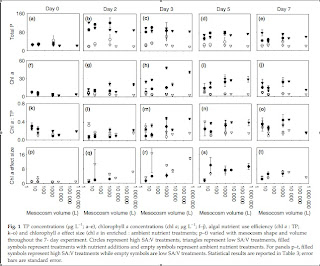In our lab, we focus mainly on metacommunity dynamics, or how the interactions between dispersal and local environmental processes influence communities in the landscape. Since we are interested in communities in the landscape, we automatically deal with the issue of “scale”. This is one of those very diffuse concepts in ecology, with as many definitions as scientists (temporal, spatial, conceptual, grain, …).
This recent article by Spivak et al. in Freshwater Biology tackles a problem experimentally that is not often studied in ecology: how applicable are the results of small-scale experiments for empirical (and by default large-scale) systems? This debate is normally fun to have with a beer, because it quickly becomes philosophical and driven more by personal believes then hard data. The novelty of this article (and also the boring part, in a way), is that it removes this debate from the beer to peer review, at least for freshwater eutrophication questions. My main confusion with this article is: “why did they publish it in Freshwater Biology?” Don’t get me wrong, Freshwater Biology is a very good journal, but after skimming the article, I got the feeling that they were shooting for Ecology or Ecology Letters. So I will have to read it in more detail to see what the potential problems are with their design, data, interpretation.
The main conclusion from the article is that the size of experimental unit has little influence on the experimental response (the difference between the open and closed symbols is the same in all mesocosm volumes):
I predict that this article will soon show up on the most-cited list of Freshwater Biology (which makes it so much more unexpected for me that they could not publish in a higher-ranking journal.
In our research, we solve the scale problem related to scaling up experimental results to empirical systems by …. choosing an empirical system that has the same scale as our experimental units! That is why rockpools … rock (pun intended), and why we will use this article to justify our research to real limnologists.
